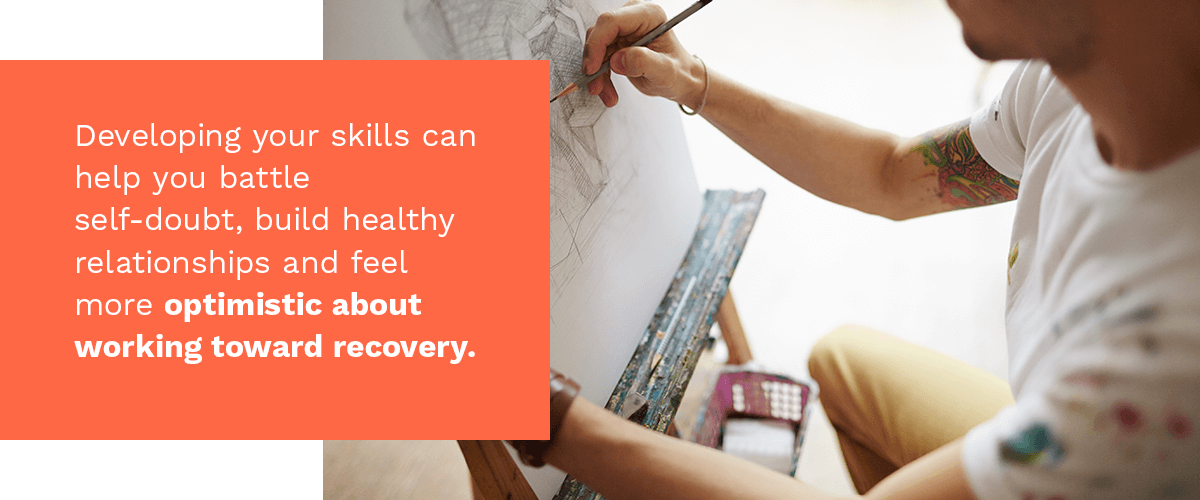5 Benefits of Art Therapy for Addiction Recovery
Art therapy provides an opportunity to express yourself and heal when you’re working toward recovery. A therapeutic approach to making art offers a path to improving mental health and well-being with conditions like substance use disorder.
Art therapy activities for addiction recovery involve creative mediums like drawing, painting and writing. Art can become a healthy coping mechanism to communicate feelings and experiences, self-reflect and build confidence. Here’s some insight into the benefits of art therapy for addiction recovery.
1. A Way to Communicate Emotions
Art therapy can help you communicate any challenging emotions you’re experiencing without the need to speak. The first days of inpatient or outpatient addiction treatment can feel overwhelming. After all, some things are difficult to express with words. It’s natural to feel hesitant to talk about personal details with a staff of professionals and other strangers.
Any form of artistic expression can help you communicate, whether you paint, write or create music. In art therapy, mental health professionals may ask you to show your feelings in the medium of your choice. As you work on your art, you’ll likely discover the thoughts and feelings you haven’t been able to put into words.
Art therapy can also help reduce symptoms of co-occurring conditions like depression, anxiety, schizophrenia and dementia, providing more comprehensive addiction treatment. Art can help you discover deep feelings and emotions, express them healthily and heal.
2. An Opportunity to Self-Reflect
Drawing, painting or other creative activities create a relaxing space to process your thoughts and emotions. Giving yourself time to think and allowing your brain to wander often leads to self-reflection, letting you form connections that can help you heal. 5 Benefits of Art Therapy for Addiction Recovery
A mental health professional might ask you to draw or paint your emotions in art therapy. Creating visible representations can help you connect with your feelings and learn how to differentiate various emotional states. They may also ask you to ponder specific questions after completing the work, such as:
- What were you thinking about as you created this piece?
- Did you experience any intense emotions?
- Are there any words you associate with this piece?
- How does this piece relate to your healing?
You might think about significant life events as you create art — a job change, meeting close friends or the death of a family member. The piece can reflect how you felt during these events, including any words you ascribe to these experiences. Over time, you can start working through unresolved conflicts that may contribute to your addiction.
You might think about your current reality as you work through the beginning stages of recovery. As you start considering how your life could be different after reaching sobriety, art can help you visualize the conditions of a healthier, more positive future.
3. The Skills to Build Confidence
As a skill-building activity without expectations or goals, art therapy can help you build confidence during addiction treatment. Developing your skills can help you battle self-doubt, build healthy relationships and feel more optimistic about working toward recovery. When you’re happier and more confident in your own skin, you’ll have more motivation to participate in positive new activities.
Here are a few ways art therapy promotes self-confidence:
- Allows self-expression: The creative process helps you learn how to express yourself without limitations or verbal censorship.
- Provides a sense of autonomy: Art therapy lets you make your own choices about art materials and how you use them in your project.
- Offers validation: Art therapy can increase feelings of self-worth as you express your unique self and fulfill the desire to be heard, seen and validated.
- Increase self-esteem: Many people with addiction also struggle with low self-esteem. Making art can help increase self-esteem by boosting your belief in your ability to create and express yourself.
Art therapy focuses on the process of art making rather than the creative outcome. It provides an opportunity to embrace imperfection and feel playful in a compassionate setting. You’ll gain a broader definition of art and what it means to you personally, which can significantly boost levels of self-confidence. 5 Benefits of Art Therapy for Addiction Recovery.
4. A Foundation for Building Healthy Relationships
Building healthy relationships is one of the most crucial benefits of art therapy for addiction recovery. When you take art therapy at a professional treatment center, you’ll spend plenty of time discussing your work and connecting with others. Over time, this discussion can foster healthy relationships as you work toward avoiding relapse together.
It’s essential to surround ourselves with art that other people create. While you may intuitively connect with your peers’ stories, voices and experiences, their work can introduce you to experiences and ideas you’ve never witnessed before. Since everyone will have similar experiences with addiction, they’ll have the insight to understand the process and the symbolic work of each person in the group.
Art can provide validation while facilitating insight and discussion, helping you form relationships that transcend differences. Over time, these friendships can become a source of encouragement through recovery and support in times of need.
5. The Tools to Help Prevent Relapse
Relapse prevention is a crucial aspect of treatment. Once you leave a professional treatment setting, you may face triggers — specific places, people, objects or emotions that you associate with substance use. Working through your cravings via creative expression is a skill that can benefit your recovery for the rest of your life.
Art provides a healthy coping skill when you feel the urge to seek substances. It can also help reduce symptoms of conditions like depression and anxiety, which often contribute to substance use disorder. Ultimately, art therapy can empower you to overcome your triggers and maintain a substance-free life.
Contact Transformations By The Gulf and Start Your Journey Today
Ultimately, art can give you a voice and help you heal. It’s also a powerful way to form connections and build healthy relationships with people who share similar experiences. Art therapy, in combination with other evidence-based treatments, can benefit people recovering from addiction.
Transformations by the Gulf offers art therapy activities for addiction recovery. Our recovery staff is ready to help you learn more about the emotions and underlying thoughts that might contribute to your substance use disorder.
At Transformations by the Gulf, we integrate holistic practices with traditional therapies, providing comprehensive treatment to address your unique needs and goals. You’ll enter a compassionate environment to learn more about yourself, build a support system and establish coping skills to break the cycle of addiction. Our programs include day and residential programs. To start your journey, get in touch with us today.
If you or someone you know would like to know more about Transformations by the Gulf Substance Abuse Treatment Center Give us a Call 24/7 (727)498-6498
The success of a person’s recovery depends on the level of personalized treatment provided. It is important to find an addiction treatment program that works. When we say our treatment is individualized, we mean that we craft a program that is tailored to address the client’s unique physical, mental and emotional needs. 5 Benefits of Art Therapy for Addiction Recovery.
In the client’s first 24 hours with us, we’ll evaluate their current state and work to understand what challenges they need to overcome. They’ll also have an initial session with our doctor and meet with one of our licensed mental health professionals.
After the initial evaluations, we’ll design a treatment plan with the sole mission of helping the client overcome and heal from addiction. Their program will focus on things such as:
- Addressing and Identifying root causes of addiction.
- Creating a support system.
- Developing healthy stress management techniques.
- Eliminating Substance use.
- Learning how to communicate emotions effectively.
- Maintaining a healthier lifestyle.
- Repairing damaged relationships.
Are you struggling with addiction and want to learn more? Visit Psychology Today or check out or page on addiction treatments.
Our Facility is near the beach and offers a comfortable setting for substance abuse treatment and recovery.
What a Day is Like in Our Treatment Facility.
Why Transformations by the Gulf?

